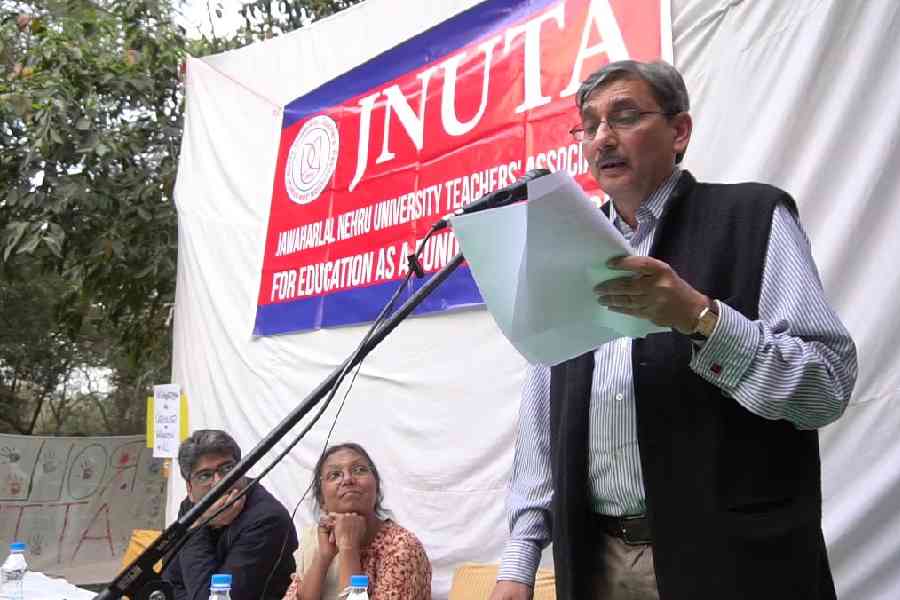Ranabir Chakravarti, former professor of ancient Indian history and culture at JNU, takes a look at southern and eastern India to buttress his point, in this dialogue with Subhoranjan Dasgupta, professor of human science, that the political systems in ancient and medieval India cannot be considered precursors to modern democratic systems.
Q: Let us look to the south. Neelkantha Sashtri, perhaps the greatest historian of south India, suggested that the Cholas had the Byzantine system of monarchy in combination with vibrant, local self-rule. The Chola monarchs functioned through the institution of local, elected assemblies. What was the real picture, did it approximate an actual democratic polity?
Chakravarti: One often hears about local self-rule in rural Tamil Nadu even under the formidable Chola kings, especially in the famous 10th-century Uttiramerur inscription of the Chola ruler Parantaka. The epigraphic mention of annually “elected” members of the village assembly and various committees thereof (including one looking after local irrigation) cannot obfuscate the fact that this related exclusively to a sabha of a Brahmana rural settlement (Brahmadeya). The features of a sabha in a south Indian Brahmana village were not replicated in non-Brahmana settlements (ur).
During the peak of the Chola monarchy (985-1130CE), such local-self rule became almost invisible. Moreover, the same Uttiramerur inscription sternly reminds us that an “elected” member of the grama sabha, whose essential qualifications demanded a thorough proficiency in Brahmanical sastras and commentaries (bhashyas), would be disqualified, among other things, by any association with outcastes and the eating of forbidden food.
The unmistakable upper varna bias against the a-varna groups is diametrically opposed to any democratic ethos. A basic equality before the law — the primary precondition for a democratic polity — was downright negated and opposed by the Brahmanical legal framework and institutions that always heavily favoured the Brahmanas and ruling groups vis-a-vis the hapless lower social orders.
Even the prescribed rate of interest against a loan was oriented to the utter disadvantage of the Sudra.
Q: Now, let us turn to the east. What is your comment on the claim that Gopala, the first ruler of the Pala dynasty in Bengal, was elected by the common people?
Chakravarti: The first Pala ruler of early medieval Bengal, Gopala (eighth century CE), is eulogised as a king who was elected to the throne voluntarily by the people (prakriti) to end a state of total lawlessness (matsyanyaya), according to an inscription by his son, Dharmapala.
One meaning of the term “prakriti” is indeed “people” — more accurately, “subject population”. However, the Arthasastra and the famous Sanskrit lexicon Amarakosha understood by the term “prakriti” the seven elements of the monarchical State (the king, functionaries, populated territory, fortified capital, treasury, army and allies). Read in the light of these two texts, Gopala’s accession to the throne was due to the concerted efforts of interest groups in charge of the organs of the State and not by popular choice as in a democratic set-up.
Q: After traversing through the entire course of ancient and medieval Indian political history, what would be your final observation? I have particularly in mind two crucial drawbacks or deficiencies: the oppressive caste system and the total subjugation of women.
Chakravarti: Many of the claims about the prevalence of democratic polities in early India were made by nationalist scholars in the early 20th century, during the heyday of the movement against colonial rule. Under these circumstances, some scholars enthusiastically asserted that some of the socio-political strands of a modern democratic polity had been anticipated in India in remote times.
Such claims do not pass the scrutiny of critical readings of ancient sources and contextual analyses of these testimonies by following rigorous historiographical methods. It is impossible to demonstrate the participatory role of the people in general in the political institutions of ancient times, when monarchy was the order of the day and a patriarchal and varna-jati society perpetually reduced women and the lower social orders to utter denial, dishonour and disability.
The dominance of monarchy would simply not uphold the primacy of citizenship with equality before the law and equal voting rights, which are essential to a democracy. The study of the past explains the accumulated events, experiences and situations that make the present situation. Historical studies are not meant for inculcating a sense of pride, because if (history is) done so, it inevitably carries some prejudice against the perceived other.










